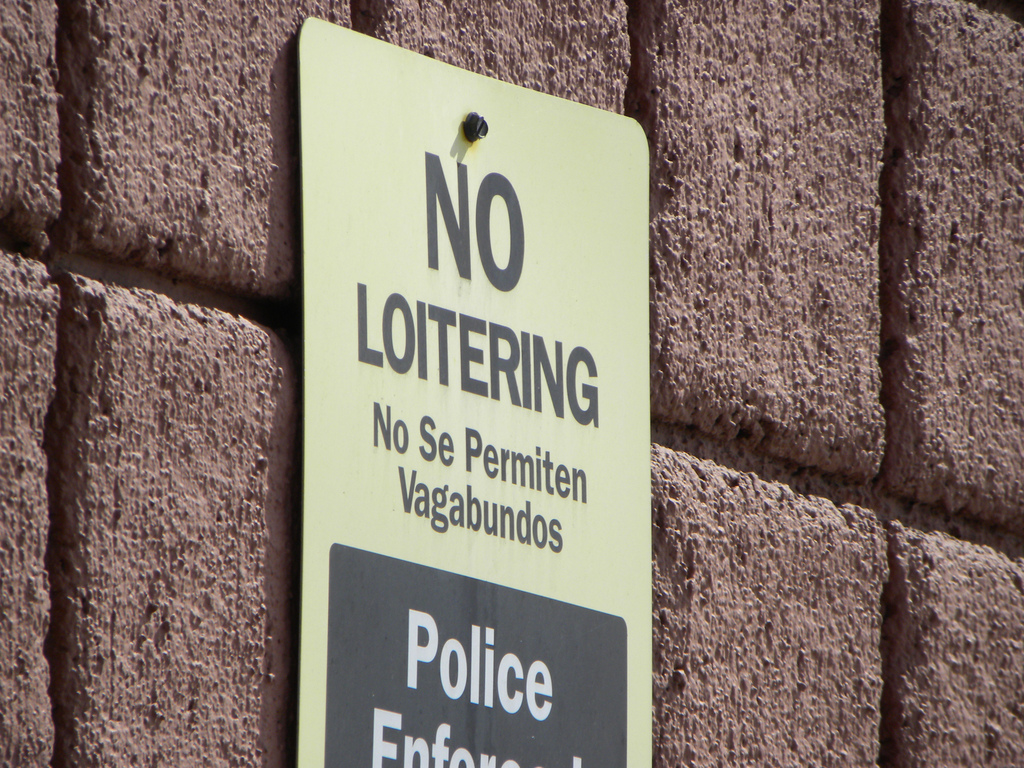Loitering, Jaywalking, Mopery: Crime or Punishment?
Food Not Bombs, a grassroots organization focused on food justice, are facing their second round of legal battles this month after their demonstration in Tampa, Florida, that led to the arrests of seven activists. Other organizations in Tampa have faced similar action or threats by the local authorities over their illegal behavior – feeding homeless people in a public place without a permit.
The laws prohibiting the distribution of food on public property are municipal, but cities throughout Florida have similar restrictions and require permits for this sort of activity. Members of Food Not Bombs have regularly provided free food without a permit for years, and city officials looked the other way. But last month was different– activists have blamed the sudden crackdown on the College Football Playoff National Championship and related events taking place in Tampa that weekend. Arrests were made at a similar event in Tampa ahead of the Republican National Convention in 2011.
Efforts to “clean up” the downtown areas before tourism events seem to continually fuel enforcement of these bans– but what does selective enforcement imply about the intention and effects of laws that affect the homeless?
Across the country, the homeless encounter similarly directed ordinances against sleeping on park benches and bench removals, curfews, “sit-lie” laws, “anti-camping” ordinances, loitering laws, smoking bans, hostile architecture, stop-and-identify statutes, prohibitions on panhandling and soliciting, forced removal and the selective enforcement of all of the above. Not only do these laws make basic urban survival much more difficult, but they align the stance of communities to exclude, instead of support, those without stable housing. As the gap between the extremely poor and extremely rich drifts even wider, sentiments that demonize the homeless have become part of the very fiber of urban life and law.
Outside of specific legislation, city councils have developed plans to best solve the public relations problem of this population they find so distasteful. San Diego’s website, for example, suggests on their page, entitled “Dealing with Homeless People,” concerned parties to perform a citizen’s arrest on individuals suspected to be homeless and committing a crime. Other advice includes:
- “Avoid confrontations and maintain a safe distance. Use caution is dealing with them.
- Do not offer food or money. It may encourage more panhandling.
- Restrict access to sidewalk overhangs, alcoves, or other areas protected from inclement weather.
- Lock or remove handles from water spigots.
- Keep trash dumpsters locked when not being filled or emptied.”
…and 25 other tips for “avoiding problems” with the homeless.
The implication of this sentiment can range between dehumanization and discrimination– but also in result, both police and citizen violence against homeless people is on the rise. The National Coalition for the Homeless claims that there is a strong correlation between the appearance of laws criminalizing homelessness and the increase of hate crimes or violent acts against homeless people. A 2014 report from the National Law Center on Homelessness and Poverty found that cities that enact the most laws criminalizing daily activities often carried out by people without stable housing also have the largest share of incidents of violence against the homeless.
It’s not just civilian violence that affects quality of life, however, but camping and sit-lie laws make life nearly impossible for people without housing. One account from the National Law Center on Homelessness and Poverty’s report No Safe Place shows the effects of these particular ordinances; Jacob reports:
“The cops give us no rest. I mean, we can’t even sleep at the park anymore because it’s against the [law] to camp. Even if we sleep [on the streets] we get ticketed. There was one night I couldn’t even get a full eight hours of sleep because I was getting woken up by cops and told to go from place to place. And I would just go lay down and get woken up an hour later. Go lay down another place, and get woken up. I got five tickets that night.”
Jacob’s account shows the criminalization of homelessness that prevents these individuals from securing economic or legal footholds, let alone helping them move towards housing stability.
Sandy shows the additional fears and dangers of the transience caused by the enforcement of sit-lie laws for women:
“I sleep on the sidewalk, in a sleeping bag, [because I can’t sleep in my car]. And I’m trying to… I don’t use drugs. I don’t use alcohol. I don’t really do anything wrong. . . . I’ve got a warrant right now for sleeping outside; basically it’s a trespassing warrant. I was trying to get away from people who were, um, because of various reasons; drugs or whatever. . . . But I have to get away from them. And some nights you literally have to hide. It’s not safe for women, especially older women.”
These laws endanger the lives of the homeless population, and especially homeless women, by preventing them from finding suitable and safe shelter. The effect of these laws is to make these cities more hostile environments for homeless people, to drive them out of shelter options.
This confluence of laws and attitudes constitutes a systematic weaponization of cities’ legal and physical architecture to criminalize homelessness and transient poverty. Homelessness is repeatedly punished, as its association with misdemeanor crime attracts disdain and fear rather than the hope of rehabilitation. Laws that intend to “clean up” the streets continue to further marginalize the homeless and deny them life-sustaining faculties, which must constitute a violation of human rights. If cities are not prepared to support the welfare of these citizens, they certainly must reevaluate their current methods of “cleaning up.”





